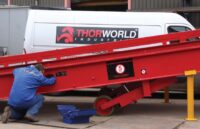 As the economy continues to bite hard, companies are understandably thinking of cutting costs by not investing in new equipment, and relying on existing machinery. Yet, according to Thorworld Industries, this means that it is more important than ever that users of loading bay equipment commit to a rigorous maintenance programme to ensure that their equipment is safe and effective.
As the economy continues to bite hard, companies are understandably thinking of cutting costs by not investing in new equipment, and relying on existing machinery. Yet, according to Thorworld Industries, this means that it is more important than ever that users of loading bay equipment commit to a rigorous maintenance programme to ensure that their equipment is safe and effective.
Thorworld identifies two elements: the inspection by a competent person, which is a legal requirement; and preventative maintenance, which takes a proactive approach to anticipating future problems and fixing them before they affect operational efficiency. As Thorworld managing director points out, many firms rely on the former, but too many are unaware exactly of what is demanded by law.
“We’ve seen recently that companies are going to local inspectors, who are untrained in the specification of certain types of loading bay equipment. As a result, they are inspecting and certifying yardramps and dock levellers, for example, under the wrong regulations, and missing crucial safety features. Not only does this mean that companies are not meeting their legal requirements, but it does not address potential safety hazards and equipment breakdowns,” John Meale explains.
Confusion arises because of the way that the law is structured in the United Kingdom. Across Europe, there is a single regulation – the Use of Work Equipment directive – that applies to all forms of machinery. In the UK, there are two laws covering different aspects.
The Provision and Use of Work Equipment Regulations (PUWER) applies to all equipment used by an employee at work. Equipment used to lift or lower loads (or people) is also subject to the additional requirements of The Lifting Operations and Lifting Equipment Regulations (LOLER). Too many inspectors are unaware of the differences, and are therefore inspecting equipment used in a loading bay incorrectly. For example Yardramps and Dock Levellers are classified as bridging devices and therefore aren’t regulated by LOLER.
“It’s essential that users of loading bay equipment seek out competent people who know the equipment, and can appreciate the often subtle distinctions between what is required by LOLER and by PUWER, and how to apply this in practice to the equipment in question,” he advises.
“We’ve seen equipment that is in a terrible condition and unfit for purpose, yet operators falsely believe everything is fine because they have the incorrect certification,” confirms John Meale.
ALEM, the relevant industry body for Loading and Elevating Equipment in the UK, is currently looking towards a system of approving Competent Loading Bay Engineers who can then inspect Loading Bay Equipment. In the meantime, Thorworld believes that the surest way to be confident is to use only ALEM Members’ products which will have the right approvals, and ask the ALEM Member to conduct the inspections.
“It’s accepted that the manufacturer of any piece of equipment will provide the most robust and appropriate preventative maintenance, but it’s clear that the same applies to inspections,” concludes John Meale. “In times when existing equipment is being worked longer and harder in lieu of the lack of investment in new products, it’s absolutely vital to get it right.”
Thorworld Industries Ltd
Tel: 01246 260981
Email: info@thorworld.co.uk




Comments are closed.